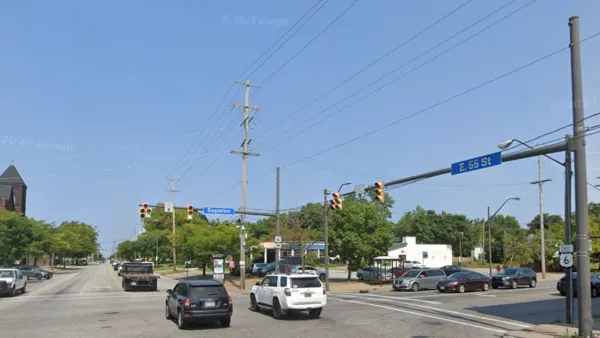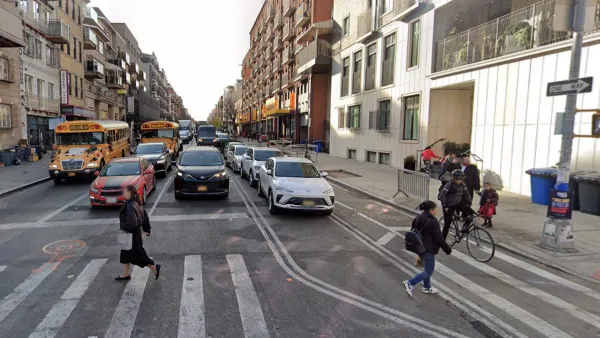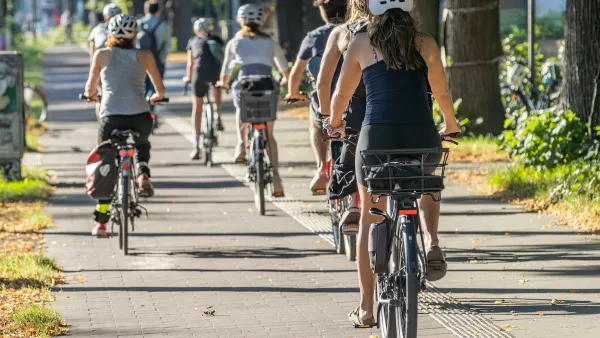Joseph Cutrufo reports on a bill under consideration in the Connecticut State Legislature that would clear the way for the construction of bike infrastructure that matches the state's complete streets ambitions.
Connecticut's statewide complete streets policy often encounters an obstacle when local jurisdictions act to implement protected bike lanes, contra-flow lanes, or bike lanes on the left side of one-way streets. The problem is the precedent set by a state statute, Section 14-286b, which states: "Every person operating a bicycle upon a roadway shall ride as near to the right side of the roadway as practicable." According to Joseph Cutrufo, " The wording of Section 14-286b has stymied efforts to bring 21st century transportation infrastructure to cities and towns across Connecticut, including plans to install a two-way cycle track in New Haven."
So state legislators have responded to local concerns by authoring Bill No. 502, also known as "the bike bill." According to Cutrufo the bike bill "creates new exceptions to the state’s ride-to-the-right regulation: one which says people on bikes may 'ride as near to the left-hand curb or edge of' one way streets, and another which permits 'riding on parts of roadways set aside for the exclusive use of bicycles, including, but not limited to, counter-flow bicycle lanes, left-handed cycle tracks on one-way streets and two-way cycle tracks.'
The article includes more details about the bike bill, including a detail about its advocacy for the Connecticut Department of Transportation to officially recognize the National Association of City Transportation Officials' Urban Street Design Guide and Urban Bikeway Design Guide.
FULL STORY: “Bike Bill” Would Pave the Way for 21st Century Bike Infrastructure in Connecticut

Maui's Vacation Rental Debate Turns Ugly
Verbal attacks, misinformation campaigns and fistfights plague a high-stakes debate to convert thousands of vacation rentals into long-term housing.

Planetizen Federal Action Tracker
A weekly monitor of how Trump’s orders and actions are impacting planners and planning in America.

In Urban Planning, AI Prompting Could be the New Design Thinking
Creativity has long been key to great urban design. What if we see AI as our new creative partner?

Portland Raises Parking Fees to Pay for Street Maintenance
The city is struggling to bridge a massive budget gap at the Bureau of Transportation, which largely depleted its reserves during the Civd-19 pandemic.

Spokane Mayor Introduces Housing Reforms Package
Mayor Lisa Brown’s proposals include deferring or waiving some development fees to encourage more affordable housing development.

Houston Mayor Kills Another Bike Lane
The mayor rejected a proposed bike lane in the Montrose district in keeping with his pledge to maintain car lanes.
Urban Design for Planners 1: Software Tools
This six-course series explores essential urban design concepts using open source software and equips planners with the tools they need to participate fully in the urban design process.
Planning for Universal Design
Learn the tools for implementing Universal Design in planning regulations.
Gallatin County Department of Planning & Community Development
Heyer Gruel & Associates PA
JM Goldson LLC
City of Camden Redevelopment Agency
City of Astoria
Transportation Research & Education Center (TREC) at Portland State University
Jefferson Parish Government
Camden Redevelopment Agency
City of Claremont





























